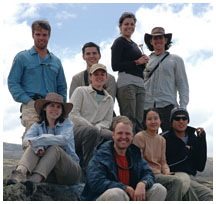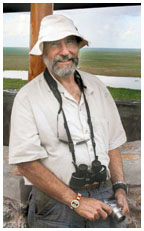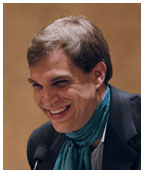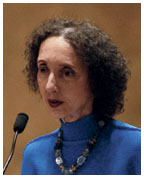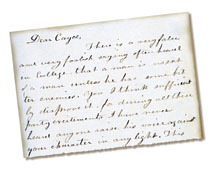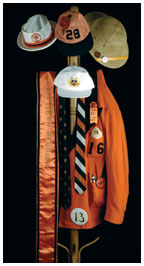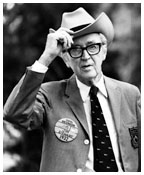
|
April 19, 2006: Notebook
For students in Kenya, immersion in ecology
Collectors go online in search of Princetoniana
Seniors win Class of ’56 public interest fellowships
Museum seeks talks on artifacts
At the top of Mount Kenya are, clockwise from top left: Greg Schundler ’07, Nick Lilly ’07, Lauren Elachi ’07, Mark Dalgarno ’07, Paul Pawlowski ’07, Jenn Ruskey ’07, graduate student Nathan Gregory, Kristen Ruch ’07, and Melissa Ivins ’07. (courtesy Paul Pawlowski ’07)
Dan Rubenstein (courtesy Jeanne Altmann) |
For students in Kenya, immersion in ecology
When ecology and evolutionary biology major Nick Lilly ’07 arrived in Kenya in February, he and his classmates in Princeton’s new tropical biology semester took a van ride from the airport to an ecology center in the capital city of Nairobi, which borders a national park. Riding on a highway, Lilly glanced out the window and saw zebras calmly grazing in the median. “I realized I was a long way from home,” he said.
It was an apt welcome for Lilly and the seven undergraduates studying, among other things, the confluence of nature and development in east Africa. One of their first projects was to travel to the Princeton-affiliated Mpala Conservancy, a 48,000-acre ranch and research area in central Kenya, and design a conservation plan for the region. Students were required to take into account the viewpoints of various stakeholders, from local villagers to eco-tourists to cattlemen. Professor Dan Rubenstein, chairman of the ecology and evolutionary biology department, said it was one of several experiences in the Kenya semester that simply cannot be duplicated in the classroom. By working in the field, he said, “[The students] actually understand the real world. They appreciate the subtlety of how things work. They see nuance.”
Studying abroad is nothing new for the ecology and evolutionary biology department, which has run a spring semester program in Panama, in cooperation with the Smithsonian Tropical Research Institute, since 1998. But in recent years, the Panama program grew to include more than 20 students — beyond its ideal capacity — so the department decided to add a second program in Kenya, where Rubenstein and Professor Jeanne Altmann conduct field research. Of the 14 students who signed up for the tropical biology programs in Panama and Kenya this spring, eight chose the Kenya semester. “Though my interests lined up more with the program in Panama, my desire to experience a totally new culture drove me toward the Kenya program,” explained Jenn Ruskey ’07, whose only previous field experience had come in a high school marine biology course on Vancouver Island.
Student interest in Africa reaches well beyond the ecology and evolutionary biology department, according to Rubenstein, who half-jokingly calls it the “continent of the decade.” Rubenstein heads the University’s Program in African Studies, and he would like to expand the Kenya semester to reach a broader audience, including students majoring in areas such as the social sciences or engineering.
This year, though, the curriculum for the three-month program is focused largely on ecology and evolutionary biology, drawing on the expertise of Rubenstein, Altmann, and two graduate alumni working in Kenya. The semester began with a three-week course in ecology and conservation on African landscapes, taught on-site at Mpala by Nick Georgiadis, the director of the Mpala Research Centre, and Philip Muruthi *97, a program coordinator at the African Wildlife Foundation. Rubenstein taught the next course, on the natural history of mammals, with help from Altmann, who hosted a weeklong visit to her baboon research site in Amboseli, in the south of Kenya, near Tanzania. Princeton mechanical and aerospace engineering professor Winston Soboyejo taught the third course, on global technology, and Paula Kahumbu *02 is scheduled to complete the program with a hands-on class in restoration ecology. Kahumbu is the general manager of Lafarge Eco Systems, a cement company subsidiary that works to rehabilitate the landscape at former mining sites in Kenya.
By taking one course at a time, the students are able to delve into their work as full-time researchers do. Lilly and Ruskey said they prefer the schedule, while colleague Paul Pawlowski ’07 said that the intense study required him to make adjustments. Rubenstein said most students embrace the opportunity to be immersed in ecology early in the program, and the others adapt during the semester. Based on his experience with the Panama program, Rubenstein said that the tropical biology program will pay dividends when the juniors choose topics for their senior independent work. “Now they have some ideas of what’s interesting to them,” he said. “And passion matters.”
Ruskey, who said she embarked on the Kenya trip with “the ominous shadow of a library thesis” looming over her, found her inspiration in Rubenstein’s mammals course at Sweetwaters Game Reserve. She hopes to return to Kenya in the summer to study hybrid zebras for her thesis, and she is confident that she has the tools to get started.
“We’ve been designing and carrying out our own experiments
— actually doing the real thing — with more independence than
I’ve ever experienced in a course before,” Ruskey said. “We
now know how to ask the right questions and how to set out answering them.”
![]()
By B.T.

(Photo by Celene Chang ’06) |
“According to current forecasts, carbon dioxide will increase in the next 30 years three times more than the increase in the last 250 years. ... Getting sustainable CO2-neutral energy is a real imperative. ... Can synthetic organisms be engineered to produce some type of liquid fuel from the biomass ... to grow energy?”
Steven Chu, director of the Lawrence Berkeley National Laboratory and
a 1997 Nobel laureate, speaking March 30 in McDonnell Hall on “The
energy problem: our current choices and future hopes.” ![]()

Gabe Hudson
Joyce Carol Oates |
(photographs by Frank Wojciechowski)
At Princeton, comparative literature is a modest-sized department — about 100 people, if you combine faculty, graduate students, and undergraduate majors — but for four days during spring recess in March, the University served as the nexus of America’s comparative literature community. About 1,200 scholars filled Princeton’s lecture halls for the American Comparative Literature Association’s annual conference, discussing papers on a wide variety of subjects under the general heading of “The Human and Its Others.”
Conference attendance was double that of other recent ACLA conferences, according to Princeton professor Sandra Bermann, the vice president of the association. The broad theme, which encompassed everything from ancient texts to modern cinema, may have been partly responsible. (The call for papers asked participants to examine how literature draws the boundaries of what it means to be human and creates “others” against whom humans can be measured.)
The involvement of Princeton’s creative writing community attracted considerable interest as well. Keynote speaker Toni Morrison, the Robert Goheen Professor in the Humanities, drew a near-full-house crowd to Richardson Auditorium March 24, and creative writing faculty members C.K. Williams, Joyce Carol Oates, Gabe Hudson, and Susan Wheeler presented readings on March 23, the conference’s opening night.
Morrison’s talk took the form of an interview, with Valerie Smith, the Woodrow Wilson Professor of Literature, guiding the discussion. Smith asked Morrison about her current projects, which include a turn as a guest curator at the Louvre, and about general themes, like the role of art in society. “Art summons meaning,” Morrison remarked, “where other disciplines describe.” When Smith opened the session to questions from the floor, the conference attendees focused on Morrison’s existing works, asking about the title character of her 1973 novel Sula, the role of community in her 1998 novel Paradise, and her impressions of the 1998 film version of Beloved. “There’s never been a financially successful movie in the United States about slavery from the point of view of the slave,” Morrison said in response to the latter question. “But there is Gone With the Wind, and there is Birth of a Nation. ... [M]y real satisfaction is that [the film] provoked a lot of people to buy the book.”
For Bermann, the chairwoman of the comparative literature department for the last eight years, the conference was an opportunity to raise the profile of the humanities on campus and display her department’s broad talents. Created in 1975, the department built a reputation for its faculty’s expertise in Western European works; in recent years the department has attracted faculty members whose specialties include Western European, South Asian, and Middle Eastern literatures.
Bermann said comparative literature, which as a major requires fluency in two languages other than English by graduation, attracts analytical students who seek an understanding of several cultures. While some go on to careers in academia, many pursue law, business, or medical school, she said.
At the conference, papers and discussions covered technology, medicine,
politics, and social issues — a range of topics consistent with
the department’s approach, Bermann said. “Literature,”
she said, “enters into all of these domains.” ![]()
By B.T.

Collectors go online in search of Princetoniana
McHenry Howard 1858’s inscription to classmate Ellis Cayce is part of Cayce’s autograph book, a recent addition to the Mudd Library collection. |
In his undergraduate years, Ellis Cayce, Class of 1858, compiled an autograph book that contained etchings of Princeton scenes, obituaries of lost classmates, and signatures from faculty whose names now adorn campus buildings. But the jewels of the book were the poetic messages from his antebellum peers, in which they recalled the “halcyon hours of college life” and braced for “darker hours” to come. When Cayce’s son Paul wrote to the class reunions chairman in 1898 to notify him of his father’s death, he quoted passages from the inscriptions.
Autograph books provide valuable glimpses of University history, according to Dan Linke, the University archivist. Mudd Library houses about 200 such books, most of which were donated by relatives of deceased alumni. But Cayce’s took a more modern route to the archives: It was purchased on eBay last year by donor Vsevolod “Sev” Onyshkevych ’83, with an assist from a group of alumni collectors.
For nearly four years, Dave Cleaves ’78 and colleagues on the Alumni Council’s Princetoniana Committee have scanned online auctions from eBay, Yahoo, and other sites, compiling items of Princeton interest in a weekly e-mail to alumni collectors. Cleaves’ distribution reaches about 70 people, including Linke, and by the time Linke told list members last summer that the Cayce book would be a nice addition to the archives, Onyshkevych had already placed a bid. When he won the auction, he donated the book.
Cleaves estimates that of the listings he and other Princetoniana Committee members flag, fewer than 1 percent pique Linke’s interest. (While Mudd has a modest acquisitions budget, Linke said, donations are still responsible for the bulk of the growing catalog of Princetoniana.) But alumni on the list are always looking to build their collections. Postcards, Triangle Club programs, Reunions beer cans, and sports memorabilia are among the items most frequently available. Cleaves’ personal tastes favor medals and books. His purchases include an inscribed tome given by University trustee Richard Stockton, Class of 1748, to Samuel Davies, Princeton’s fourth president.
Princetoniana buffs typically collect for fun, not profit, and Cleaves
said many plan to donate their collections to the archives eventually.
Online auctions have made the hobby much easier, but some Princeton artifacts
are still hard to find. “I haven’t seen any clappers yet,”
Cleaves said. “I guess that if you were lucky enough to have gotten
one, you probably aren’t going to part with it at an auction.”
![]()
By B.T.
Alumni interested in joining Cleaves’ Princetoniana e-mail list should contact him at dcleaves@alumni.princeton.edu.

Princeton University Archives |
Reunions artifacts from as early as the turn of the 20th century are
on display through July 28 in “Going Back in Orange and Black,”
an exhibit at Mudd Library’s Wiess Lounge. Common costume elements,
such as jackets, hats, and name-tag buttons, figure prominently in the
display, but Mudd’s archivists have located more peculiar items
as well: real tiger-claw pendants, a Class of 1970 temporary tattoo, and
a commemorative orange-and-black toothbrush given to reuners at the Class
of 1904’s 35th. Also included are pictures of familiar faces like
Jimmy Stewart ’32, above at his 50th reunion, and Brooke Shields
’87 showing their Tiger stripes. Visitors can browse the Reunions
garb from 9 a.m. to 4:45 p.m. Monday through Friday and until 7:45 p.m.
Wednesdays. ![]()

Seniors win Class of ’56 public interest fellowships
Two Princeton seniors will each receive $25,000 ReachOut 56 fellowships from the Class of 1956 to support their yearlong public service projects.
Krista Brune ’06
Derrick Raphael ’06 (Photographs by John Jameson ’04) |
Krista Brune, from Centennial, Colo., said she wants to learn “what makes a successful prison arts program” and is planning research in several states for a book on arts and education programs in prisons. She is majoring in Spanish and Portuguese Languages and Culture. Derrick Raphael, a sociology major from Fayetteville, N.C., will focus on developing new programs to motivate disadvantaged teenagers to attend college.
The ReachOut 56 fellowships are designed to pay living expenses for a year for new graduates working with nonprofit groups, said James Freund ’56, a retired New York lawyer who initiated and who oversees the project. He said this makes the program distinctive among various public service projects organized by Princeton alumni classes.
Each applicant for the fellowship must find a group to work with, then create a project proposal. “We prefer to select organizations that wouldn’t be able to afford the help otherwise,” Freund said.
Raphael will work with the Educational Talent School program at Fayetteville State University, which supported his efforts to apply to Princeton while in high school. “I want to continue working in the public service sector throughout my life, and this opportunity provides the expertise needed,” he said.
Brune, who has led the prison reform group of the Princeton Justice Project, will work with Voices UnBroken, a Bronx, N.Y.-based nonprofit providing resources for creative expression in New York correctional facilities. Alumni supporting ReachOut 56, she said, “have demonstrated a profound dedication to Princeton, to service, and to the future of new generations of Princeton alums like myself.”
This is the fifth year the fellowships have been awarded. Freund said the fellowship program has no endowment and is funded on a “pay-as-you-go” basis, with contributions from about 100 class members.
Noting that his 50th reunion is coming up this year, Freund said the Class of 1956 has approached the 25th reunion class, the Class of 1981, to see if there is interest in joining in the program to ensure that it will continue in future years. “We want to encourage other classes to do this,” he said.
Chaired by Daniel Gardiner ’56, ReachOut 56 also supports a mentoring program at Paul Robeson High School in Brooklyn, N.Y., and helped develop a DVD-based program called “Why College” to help students understand and take advantage of college opportunities.
The Class of 1956 received the Award for Community Service from the
Alumni Council in 2004. ![]()
By W.R.O.

Steven Veach |
Cell block
The United States is “falling uncharacteristically behind” in human embryonic stem cell research, and restricted funding may well be one of several contributing factors in the trend, according to a recent study published in Politics and the Life Sciences by Aaron Levine, a Woodrow Wilson School Ph.D. candidate. Using citation data from a database of scientific papers, Levine found that from 1998, when researchers first isolated human embryonic stem cells, to 2004, the share of research publications in the field credited to U.S. authors was significantly lower than the share of U.S. publications in less politically contentious technologies, such as DNA microarrays. (For accuracy in comparison, Levine used data from the six years following the introduction of each technology.) U.S. stem cell research took its most significant dip in 2003, dropping from 41 percent of papers on the topic worldwide to 30 percent, a level maintained in 2004.
Information overload
Will the abundance of political news available on cable television and
the Internet engage and inform voters? Or will the entertainment options
available on the same media drown out public interest in politics? Markus
Prior, assistant professor of politics and public affairs, said yes to
both arguments in a paper in the July issue of the American Journal
of Political Science. Using data from a national opinion survey,
Prior showed that while some people who follow the news are able to gain
more knowledge via cable and the Web, others have decided to tune out
politics. The result is a wider gap between the informed and the uninformed.
And the best hope for engaging news-averse viewers may come from what
Prior called “that reviled form of communication”: political
advertising. ![]()

Joseph M. Collier (1836–1910). “Pike's Peak or Bust,” Colorado, between 1871 and 1878. Gelatin silver print. More than 100 photos from Firestone Library’s Collection of Western Americana will be on display in the library’s main gallery as part of a new exhibition: “FRAMING THE FRONTIER: PHOTOGRAPHERS & THE AMERICAN WEST, 1850–1920.” The exhibition, which runs from April 29 through Sept. 24, illustrates how photography helped open the West to settlement and define it in the American consciousness. In honor of Alfred L. Bush, who retired as Firestone’s curator of Western Americana in 2002, the Friends of the Library will hold a daylong conference April 29 on the early photography of the American West. To register for the conference and reserve a box lunch, call 609-258-3155.
TOM RIDGE, former secretary of homeland security and Pennsylvania governor, will speak Wednesday, April 19, at 6 p.m. in McCosh 10 on public service as “The Best Prize in Life.”
THE UNIVERSITY CONCERT JAZZ ENSEMBLE, directed by Anthony D.J. Branker, will join with the Juilliard Jazz Orchestra, directed by Victor Goines, Saturday, April 22, at 8 p.m. in McCarter Theatre for an evening of big-band sounds. The Concert Jazz Ensemble is dedicated to the works of Duke Ellington and Billy Strayhorn. Each group will perform its own set, then play together in an encore of Ellington’s “Far East Suite.” For tickets, call 609-258-2787.
A two-day Woodrow Wilson School colloquium April 28 and 29 will examine the accomplishments and failures of WOODROW WILSON 1879’s career as a public servant. Among the topics will be Wilson’s foreign policy; his views on women, minorities, and immigrants; and his call to public service. Former secretary of state Madeleine Albright will deliver a keynote address Friday at 4 p.m. On Saturday at 10:30 a.m., President Tilghman will moderate a panel on Wilson’s Princeton experience that includes Nannerl O. Keohane, former Duke president; Neil L. Rudenstine ’56, former Harvard president and a former Princeton provost; and S. Georgia Nugent ’73, Kenyon College president and a former associate provost at Princeton. For a schedule and registration information, go to www.wws.princeton.edu/pcpia/.
The author of “State of War: The Secret History of the CIA and
the Bush Administration,” New York Times reporter JAMES
RISEN, will speak Tuesday, May 2, at 4:30 p.m. in Dodds Auditorium
of Robertson Hall. ![]()

Museum seeks talks on artifacts
Susan M. Taylor, director of the University Art Museum, was scheduled to travel to Rome this month to discuss the concern of Italian authorities that four objects in the museum’s collection were removed illegally from Italy.
The University said in a statement in November that Italy was interested in two ancient Greek vases acquired by the art museum. But University officials now say that two additional museum objects, a small Roman silver cup and a fragment of an Etruscan terra-cotta plaque, are also of interest to Italian authorities investigating whether prominent American museums acquired illegally excavated artifacts.
The University asked for a meeting “to hear directly from the Italian government its concerns about these objects” in a Feb. 17 letter to the minister of culture, according to Princeton spokeswoman Cass Cliatt ’96. In the November statement, Taylor said that the museum had purchased the two vases in good faith and had no knowledge of any wrongdoing associated with their acquisition. But she said the items would be returned “if proof of illegality is presented to the museum.”
The Metropolitan Museum of Art in New York agreed in February to return 21 objects to Italy in the face of evidence that they had been looted; Italian authorities offered to lend the museum other artifacts as a show of “good will.”
Princeton’s museum voluntarily returned a funerary monument piece to Italy in 2002 after determining that it had been illegally exported. As part of that agreement, the art museum requested a long-term loan of a comparable object, but that has not taken place, according to museum spokeswoman Ruta Smithson.
While the University’s 2002 agreement with Italian authorities
“parallels” that of the Metropolitan Museum, Cliatt said,
“Princeton is its own model for successful resolution of cultural
property claims.” ![]()
By W.R.O.

The Supreme Court’s March 6 ruling to uphold the SOLOMON AMENDMENT, which allows the secretary of defense to deny federal funds to universities that restrict the access of military recruiters on campus, has forced Princeton to make “relatively modest changes” to its policy for on-campus recruiters, Provost Christopher Eisgruber ’83 said at the March 27 meeting of the Council of the Princeton University Community. Under a University policy adopted in 1990, recruiters who signed a form to indicate their agreement with Princeton’s nondiscrimination policy received preference in booking rooms for individual interviews. Military recruiters cannot sign the form because the “don’t ask, don’t tell” policy that governs homosexuality in the armed forces conflicts with University policy.
As a result of the Supreme Court decision, Princeton will give military recruiters the same access as the recruiters who sign the nondiscrimination form, Eisgruber said, but nonmilitary groups that do not sign the form will continue to receive limited access.
JOSHUA BOLTEN ’76 was named White House chief of staff March 28 by President Bush, facing pressure to re-energize his administration. Bolten, who had been the president’s budget director, was praised by Bush as “a man of candor and humor and directness, who is comfortable with responsibility and knows how to lead.” A Woodrow Wilson School major, Bolten was president of his class and of Ivy Club. An avid motorcyclist who plays guitar in a weekend rock band, he has been part of the White House staff since Bush took office.
ALUMNI SCHOOLS COMMITTEES in Washington, D.C., and Boston have begun working with the admission office in a pilot program that targets nine to 12 public high schools in each city whose students are predominantly minority and low- to moderate-income. The program includes a visit to each school by alumni and an admission officer, a breakfast for guidance counselors, an event for promising high school juniors, and an evening program for students and family members. “We can’t expect students to come to us if we’re not willing to go to them,” said Dean of Admission Janet Rapelye.
The University reaffirmed its policy against campaigning in the annual YOUNG ALUMNI TRUSTEE ELECTION after one candidate mounted a petition drive to lift the ban and The Daily Princetonian editorialized for a change in the policy. “Trustees who arrive on the board having already staked out positions on issues without access to full information can undermine both the workings of the board and their own effectiveness,” said Robert K. Durkee ’69, University vice president and secretary. Durkee said providing candidates’ biographical information is being considered as part of next year’s election. The candidate pressing for change, Ira Leeds ’06, was not among the three finalists in the voting.
TWO CONTRACTORS who were renovating the University
Chapel’s north tower agreed to pay $350,000 to settle a lawsuit
filed by Alexandra Shaw ’03, who fell while climbing a spiral staircase
and ladder inside the tower the night of Dec. 13, 2001. Shaw, who suffered
a broken ankle and a concussion, was lowered from an outside landing halfway
up the tower by Princeton firemen. The University was removed as a defendant
in the case in December. ![]()

Denis C. Twitchett, the Gordon Wu ’58 Professor of Chinese Studies
from 1980 to 1994, died Feb. 24 in Cambridge, England, at the age of 80.
He was widely known for helping to conceive the 15-volume Cambridge
History of China and for editing several of the books. “Professor
Twitchett was a force that shaped the study of Chinese history in the
West for the past 50 years,” said Yang Lu *99, assistant professor
of East Asian studies. ![]()

